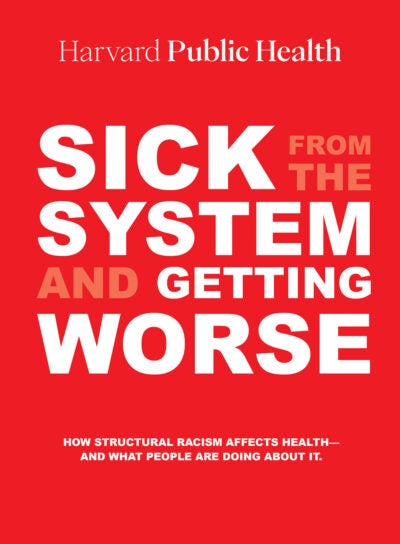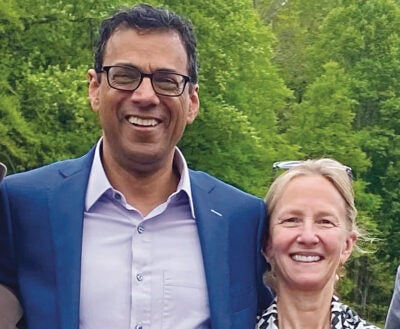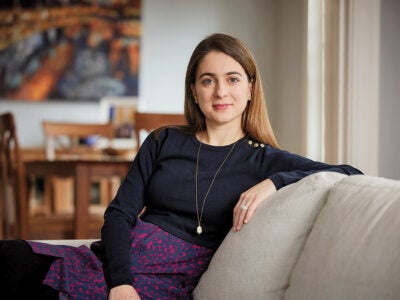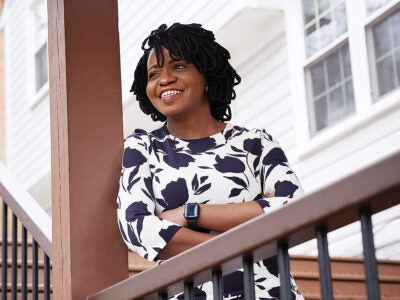
Philanthropic impact
Finding public health programs that work
Food keeps Cristina Gago up at night. Not because of cravings or indigestion—Gago, who received her PhD from Harvard T.H. Chan School of Public Health in May, stays up late thinking about nutrition and public health. “It’s not something that I can just put down when I’m done with work for the day,” she says. Gago, now a postdoc at New York University Langone’s Center for Healthful Behavior Change, says “nutrition is part of every piece of our lives. There are huge, obvious disparities in access to food, the way we’re able to interact with it, and what that means for our present selves and our future health.”
She first became aware of these disparities as an undergraduate biology student at the University of Southern California, where she taught anatomy lessons to local fifth graders as a volunteer. While discussing the digestive tract, she brought in fruits and vegetables to help illustrate how it worked. “A lot of kids just didn’t recognize what some of them were,” she says. “I thought, ‘how is that even possible?’”
The experience set her on a career path focused on improving access to health-promoting resources among traditionally underserved populations. She developed a passion for evaluating the impact of nutrition interventions as an MPH student at the University of Southern California’s Keck School of Medicine. When she came to Harvard Chan School for her PhD, she focused on project evaluation. While a student, she implemented and evaluated multiple public health projects—from culturally tailored healthy eating programs for Latino adults to family-based nutrition programs with the Massachusetts offices of WIC (Special Supplemental Nutrition Program for Women, Infants, and Children) and Head Start.
Project evaluation, she says, informs everything in public health. “You need to be able to look up prior studies and learn what’s worked and what hasn’t,” says Gago. “It’s also a really respectful practice: asking participants to reflect, and communicating to the larger world what they had to say and why it’s important. A lot of the time they’re really excited to help you make it better.”
Public health PhD programs at the Harvard Chan School are offered through the Harvard Graduate School of Arts and Sciences, in a partnership which includes full financial aid. Gago says that having this support was a welcome change from working multiple jobs while getting her combined bachelor’s and master’s at USC. “It was school and then work and then homework late at night. This funding allowed me to make my school and research my full-time job, for the first time in a long time.”
Her main source of financial support was the Harvard T.H. Chan School of Public Health–Dana-Farber Cancer Prevention Fellowship, funded through a National Cancer Institute T32 program. In addition, she received support through the Irene M. and Fredrick J. Stare Nutrition Education Fund. This fund, which—unlike some other PhD funding streams—isn’t tied to specific projects, gave her academic freedom and flexibility. “The Stare funding allowed me to work with five different mentors, work on multiple projects, and follow whatever opportunities met my learning goals.”
She drew across her experiences in working on her doctoral dissertation, a multilayered analysis of nutrition interventions for diverse, low-income families with young children. She hopes her findings will help shape future interventions to improve child and adult health.
Ultimately, Gago hopes to become a professor of population health. “I really value the collaborative nature of universities and the independence to ask questions that are urgent, novel, and important for the world,” she says. Wherever she goes, Gago plans to keep using her love for evaluation science to improve how public health works.
“I really value the collaborative nature of universities and the independence to ask questions that are urgent, novel, and important for the world.”
Nurtured by a strong legacy

The push to improve health through nutrition science has animated generations of students and faculty at Harvard Chan School since Fredrick J. Stare founded the Department of Nutrition in 1942 with a staff of three. Stare was among the first to research the influence of diet on heart disease, and his high-profile advocacy for better nutrition has helped shape the course of public health. The department he founded has grown to include more than 100 faculty and staff members and has trained hundreds of master’s and doctoral students.
Stare’s impact also continues through the Irene M. and Fredrick J. Stare Nutrition Education Fund, named in honor of Stare and his wife. The fund was established in 1976, when members of the Department of Nutrition voted to apportion part of a general fund, and it has been generously supported by the Stare family. In the 2021–2022 academic year, the Irene M. and Fredrick J. Stare Nutrition Education Fund provided financial support to six PhD students, including Cristina Gago.
Frank Hu, who is the Fredrick J. Stare Professor of Nutrition and Epidemiology and Nutrition Department chair, says the Stare Fund is meant to support the development of high-impact leaders in nutrition research and policy. “Cristina’s research is a great example, allowing the translation of cutting-edge nutritional science into public health practice and policy to improve the health of low-income families.”



